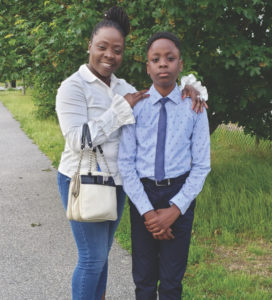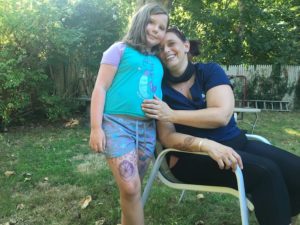After months of missed classes, child care, sports, and summer camps, the question of when children can return to school is a pressing concern for many Outer Cape families. High stress is one thing all these families have in common, and those headed by single working mothers face especially difficult choices.
The Independent spoke with two such families this week; they told strikingly different stories.
Staying Home From School

Christine Wynter knows she should not leave her son, Jeondre Higgins, age 12, alone all day to navigate six hours of school on his iPad, but that’s what she is planning to do.
“I play it out over and over in my mind,” said Wynter. “I’m a parent earning minimum wage. He needs supervision, and I work and I cannot afford child care. But it’s too dangerous to send him back. It’s a no-win situation.”
Jeondre is a student at Nauset Regional Middle School. Wynter could send him to school five days a week starting Sept. 16, because he qualifies as an English language learner. All students with special needs have been invited to school for full-time in-classroom learning. Generally, other middle schoolers are invited to school for only two days a week and must learn remotely for three days.
But Wynter, who is a home health aide in South Dennis, does not feel having Jeondre back in the classroom is safe for him or for the people she works with. Jeondre has asthma, and she works with the elderly. So, while she knows school can provide a supportive environment for her children while she’s at work, right now, she says, she cannot take advantage of that.
Wynter says others in the Jamaican community face similar complications when it comes to the reopening of school. Many earn minimum wage and have inadequate health insurance.
“The solution is that schools need to devise a strategy to focus on us, who are scared to go back and cannot stay at home with our children,” Wynter said.
Wynter said the Nauset district does not seem to have any representation of the immigrant community on its planning committees.
No Nauset administrators responded to the Independent’s inquiry about diversity on school planning committees. Cindy Horgan, executive director of the nonprofit Cape Cod Children’s Place in Eastham, who represents early education and child-care groups on the Cape Cod Reopening Task Force, said, “I’m going to be honest with you. I know a lot of providers, and there is nobody from the Jamaican community on any of the calls I am on.”
Living With More Fear
Wynter and her son live at the Village at Nauset Green, the recently opened affordable housing development in Eastham, where there also happen to be three other children entering seventh grade at Nauset with Jeondre. Wynter’s nephew, Dontae Mcinnis, 11, also just moved in with her. Why, asks Wynter, could the school not help them form a pod or small learning group, with a teacher or support staff coming to them?
“You need to look at the most vulnerable and say how can we help them?” she said.
According to a nationally representative survey of over 2,000 U.S. adults conducted by Consumer Reports in July, 57 percent of black and 52 percent of Latino parents think that schools should remain closed and that children should begin the school year taking classes online, compared with 25 percent of white Americans.
In separate interview research, Consumer Reports found that the reasons for the disparity include the knowledge that Covid-19 has disproportionately affected black and brown people and a lack of faith that safety protocols can be enforced in school.
Wynter came to the U.S. years ago and got a master’s degree in education from Central Connecticut State University. She then returned to Jamaica and taught there for a few years, before coming with Jeondre to Cape Cod as he was starting fourth grade.
She said at first, Jeondre struggled, and not just with a new culture and a new education system. At Eastham Elementary School, Jeondre said, the boys would gang up on him and play jokes on him, such as making up the names of places and then laughing when he thought they were real.
He excels in soccer, and maybe the boys felt threatened by a Jamaican who could play better than they could, Jeondre said.
His mother said Jeondre reads constantly, far above his grade level, but he had a hard time in elementary school. In middle school, however, a counselor in English language learning, Reva Blau, really helped, Wynter said.
But, she said, the pandemic threw everything off. Left at home all day starting in March, Jeondre did about 20 percent of his work. He’s bright, his mom said, but disorganized, and the remote learning was just poor. It could take hours to work out the technological glitches and get the students focused on Zoom.
Meanwhile, Jeondre watched a lot of television news about coronavirus; it terrified him to the point where he had to be coaxed even to go outdoors, she said.
Complicating the family’s decision, Jeondre himself would like to be back in class.
“Going back is risky,” he said, “but I think we should go back because I’ll get too far behind.”
Third Grade Online

Riley Robichaud, 8, has always loved school. That is, until she had to do it remotely.
She described online learning this way: “Whenever it’s three hours, it feels like 10,000 hours.”
This spring, remote learning was instituted five days a week for three hours a day at the Provincetown Schools, said her mother, Janine Robichaud of Eastham.
The online learning was a “horror show” right from the beginning, said Robichaud, “and never really got any better.”
There would be kids crying, hiding from the camera, and turning their screens upside down, she said. Parents could be heard yelling in the background, leading to more tears and more disruptions.
This lasted through the entire spring, Robichaud said, but like most parents, she and her daughter held on.
As the summer progressed and the case numbers stayed low, she felt certain the students would be able to return to classes at least at the elementary level, like the schools in the Nauset district.
Then came the email from Supt. Suzanne Scallion saying that computer-based home learning will continue even for the youngest children for at least the first two weeks of school, and possibly longer, based on data and research.
“I have not been stressed out this whole time until I got that email,” said Robichaud. “I’m a single mom who has to work full-time. I was not meant to be a teacher. That’s not my specialty. The only time we ever fight is when it’s time to go on Zoom.”
Life Without a Favorite Teacher
Robichaud thought immediately of the teacher who all Provincetown students look forward to in third grade: Mr. Shannon.
Eric Shannon is “everything you want a teacher to be,” she said. “He cares about the kids. He is just so great. I’ve heard nothing but fabulous things.” The idea of her daughter not getting Mr. Shannon in person is almost too much to bear, she said.
Robichaud grew up in Provincetown, graduated from Provincetown High School, and then raised her own family in town. Riley attended the town’s Wee Care infant and toddler program. Even when Robichaud found a better place to live in Eastham, she gladly made the effort to keep Riley in the Provincetown Schools.
“They are so in tune with every kid, and with eight to nine kids in each class, the kids really get one-on-one attention,” she said.
But now, she is considering sending Riley to Eastham Elementary, where students will attend in person starting Sept. 16.
“Maybe that’s just an empty threat,” she added. “But I have to go to work. This could kill the school.”
Provincetown Schools must keep its enrollment up. There are only 131 students; many come from other districts via school choice. Scallion said the school gained 11 news students over the summer and that the new families want the strict remote learning model. But those gains could be lost with parents like Robichaud, who want the opposite.



